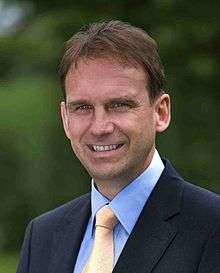Basic income in Germany
Basic income in Germany (German: Grundeinkommen), has been discussed since the 1970s, with emphasis placed on its unconditional dimension by 2003.[1] The basic income concept has many definitions, such as Philippe van Farijs', which described it as the income paid by the government, at a uniform level and regular intervals to each adult citizen and permanent residents of the country.[2] The Basic Income Earth Network's criteria constitute one of the most popular proposals and they include: 1) income must be paid to individuals instead of households; 2) income should be paid irrespective of income from other sources; and, 3) it must be paid without requiring performance of any work.[1]

In Germany, there is a national network as well as many local groups involved in the push for the basic income adoption as a state policy. Some of the most well-known proponents for the reform are Götz Werner, Katja Kipping, and Susanne Wiest. The Pirate Party Germany[3][4] and the Basic Income Alliance support the implementation of basic income across Germany.
History
The debate about basic income in West Germany began gathering steam in the 1980s, when groups of unemployed people became interested and took a stance for the reform.[5] When Basic Income European Network was founded (today Basic Income Earth Network) in 1986, there was a German sociologist among the founders, Claus Offe, who since then has been active in the academic debate.
In 2004 the Netzwerk Grundeinkommen is founded. The Hartz-reforms introduced by the Cabinet of Gerhard Shröder in 2003–2005 triggers the basic income debate quite a lot, even though the reforms themselves are widely seen as very anti-basic income.[6] A few years later, 2009, Susanne Wiest, a home wife, made a presentation in the German Parliament about the basic income petition she had initiated and which got support from 52.973 people. The next year there was several basic income-demonstrations, the biggest in Berlin. By 2011, the Pirate Party proposed basic income on the state parliament and after a two-hour-long debate it was decided that they shall work for basic income along with minimum wages.[7] In 2012 there was a meeting between Susanne Wiest and Angela Merkel to discuss basic income. The meeting took place under the democracy project "Dialog über Deutschland". In Germany on Sunday, 25 September, a new political party was founded, Bündnis Grundeinkommen (“Basic Income League”, called “BGE Partei” for short).[8] The league was admitted for state elections for the first time in federal state Saarland in January 2017 and in April 2017 for the state elections in federal state Nordrhein-Westfalen. Bündnis Grundeinkommen was admitted for the German federal election 2017.[9][10]
Presently, there is a two-tier unemployment compensation system in Germany, which consists of a form of UBI and basic income ALG II with strict behavioral requirements for the unemployed.[11] For instance, active cooperation is a major condition for access. while the system does not satisfy the criteria of Basic Income Earth Network and other reform proponents, the generosity of basic income transfers in the country is considered high by international standards especially for claimants who have children.[11]
Proponents
 Sabine Niels, BÜNDNIS 90/DIE GRÜNEN (2010)
Sabine Niels, BÜNDNIS 90/DIE GRÜNEN (2010)

 Thomas Dörflinger, CDU[12]
Thomas Dörflinger, CDU[12] Katja Kipping, Berlin 2013
Katja Kipping, Berlin 2013 Ralph Boes, Berlin 2013.
Ralph Boes, Berlin 2013.
External links
- Netzwerk Grundeinkommen (German)
- Netzwerk Grundeinkommen (English)
References
- Caputo, Richard (2012). Basic Income Guarantee and Politics: International Experiences and Perspectives on the Viability of Income Guarantee. New York: Palgrave Macmillan. p. 82. ISBN 9781137045300.
- Muller, Wolfgang (2014). Does an unconditional basic income provide higher effectiveness and efficiency? An Analysis of the social security systems of Germany, Sweden and the United Kingdom. Hamburg: Anchor Academic Publishing. p. 11. ISBN 9783954891009.
- Juli Zeh (18 May 2012). "The Pirate Party fits the political gap". The Guardian. London.
- "Pirate Party Emerges as Political Force in Germany - SPIEGEL ONLINE". Spiegel.de. 28 March 2012. Retrieved 9 June 2014.
- Ronald Blaschke The basic income debate in Germany and some basic reflections (läst 13 December 2012)
- Van Parijs, Philippe Personal reflections on the 14th congress of the Basic Income Earth Network (retrieved 13 December 2012)
- GERMANY: Pirate Party endorses Basic Income in its national campaign Archived 16 April 2014 at the Wayback Machine (retrieved 13 December 2012)
- GERMANY: Single-issue political party founded to promote UBI
- McFarland, Kate: Basic Income Party on Ballot in State Election In: BIEN international, 29 January 2017.
- Federal election committee: Procedure of admission of Bündnis Grundeinkommen to the German federal election. 7 July 2017. In: youtube.com
- Schiller, Christof (2016). The Politics of Welfare State Transformation in Germany: Still a Semi-Sovereign State?. Berlin: Routledge. p. 131. ISBN 9781317227403.
- A Basic Income for Rural Areas?